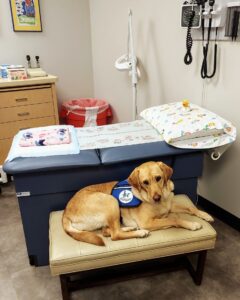Partners with Families and Children: Holding hope for a better future

At a glance
- 20 children will be victims of abuse every day in Washington state
- Spokane nonprofit provides support and tools to keep families together
- Services focus on addressing life skills, behavioral health and holding hope
The first word of this nonprofit’s name is also its best tool for changing the course of a family’s life — Partners with Families and Children.
The organization “walks alongside” families, providing wraparound services and support that can help shape their future, says Stephanie Widhalm, director of the Children’s Advocacy Center at Partners with Families and Children (Partners).
The Spokane-based nonprofit serves as a social safety net for children who have experienced — or are suspected of experiencing — abuse and neglect, along with their non-offending caregivers. Partners provides holistic, whole-family services, including the Children’s Advocacy Center, mental health and substance use disorder (SUD) treatment, and life skills development.
Originally founded in 1988 at MultiCare Deaconess Hospital, Partners obtained nonprofit status in 2003 and has since grown into its own space to better meet the needs of the community.
Through the Children’s Advocacy Center (CAC), Partners serves approximately 600 children annually across Spokane and Lincoln counties, says CEO Carol Plischke. Families are connected to Partners through referrals from Washington’s Department of Children, Youth and Families (DCYF), law enforcement, medical providers or word-of-mouth.
CAC’s goal is to help families keep their children in the home or reunify families if children have been removed, Plischke says.
A holistic approach
Family action plans are tailored to the unique needs of each child and their caregivers.
“We have to look at all the dynamics that go into a family … like untreated intergenerational trauma,” Plischke says. “Mental health and substance use disorder issues can be really big factors here, too.”
By the numbers
- 20 children will be victims of abuse every day in Washington state
- Four children die every day in the U.S. from abuse and neglect
- 12 percent of children live with a parent who has a substance use disorder
- 1 in 5 people have a diagnosable mental health condition
- 9 percent of Washington youth in grades 8, 10 and 12 report feeling depressed
- 9 percent of adults living in Spokane County report having poor mental health compared to 15.4 percent of adults in Washington state
- Opioid-related deaths in Washington state almost doubled from 2020 to 2022 to 2,069
- Partners serves more than 1,000 children and families annually
People often assume “abuse” means sexual or physical, but Partners serves children who have witnessed a lot of drug use or domestic violence in the home, says Widhalm, CAC director.
Spokane County has higher rates of domestic violence and child abuse than any other county in the state, and in some cases even double.
The Partners team begins by bringing together all the individuals and agencies involved with a family’s situation, which could include law enforcement, Child Protective Services, medical providers, forensic interviewers and prosecutors, Widhalm says.
This multidisciplinary team model allows Partners to ensure that everyone is working toward the same goal for the family, she adds.
For behavioral health clients, access to Family Team Coordination services helps families navigate the requirements of multiple agencies. Bringing everyone to the table helps manage shared expectations and makes it possible for the client to see their goals as achievable.
Partners also enlists the help of service-trained advocacy dogs, Tori and Skipper, to accompany children during exams, court hearings and mental health sessions. Their calm temperament helps ease a child’s anxiety. Tori and Skipper have also worked as comfort animals for crisis situations at local schools.
Partners has built its approach on research and evidence-based practices. Through the nonprofit’s support, the average length of time between a child being removed from a home to being reunited with their family has been cut in half — from 18 months to less than a year.
The secret ingredient
“The secret ingredient here is our staff,” says Christie Pelz, LASW, CMHS, SUDP, mental health clinical director for Partners. “It’s a different experience coming in when (parents or caregivers have) had a lifetime of oppression, stigma, biases, SUD or mental health issues. They come in on the defense and don’t have a lot of hope. We like to say, ‘We will hold hope for them until they have it for themselves.’”
The things being asked of families during a stressful situation can be challenging, especially if they haven’t had opportunities to develop coping or life skills.
“If your child has been removed by DCYF, you’re often given a long list of things to do to mitigate the concerns that led to involvement with the department, and the expectation can feel like you must do it all perfectly,” Pelz says. “If you’re struggling, oftentimes with mental health or substance use issues, and your kids have been removed, it can feel very overwhelming.”
Partners helps families navigate all those steps while also ensuring everyone in the household is getting services at the right time and right pace, she says.

Tori, one of Partners’ service-trained advocacy dogs, waits to provide comfort and support to a child in an exam room.
Children ages 2 and older, up to parenting individuals, can access a range of supportive treatment services: bio-psycho-social, mental health and SUD assessments, a range of different individual therapeutic interventions, and multiple group therapy services.
Most families enrolled in mental health services attend at least once a week individually and often also engage in group or family therapy, Pelz adds. On average, they’ll actively participate in the program for one to two years, gradually decreasing intensity and frequency as they successfully work toward their goals.
Parenting adults enrolled in the SUD program engage in group treatment one to four times per week, along with individual services one to four times a month.
“There is that philosophy of ‘We’re doing the best we can with what we know,’” Pelz says. “Our families have been given the short end of the stick and have limitations with addiction, mental health struggles or lack of life skills. We want to empower them and educate them so they parent to the best of their capacity.”
Their goal is to intervene and educate to change the trajectory of a family — and Partners does this by providing a supportive team to help families build a safe and sober support system, she adds.
Demand vs. barriers
There are so many misconceptions and systems of oppression working against the population that Partners serves, Pelz explains.
“Many people would say they’re less worthy of help,” she adds. “Every life and family is valuable, though. Whether you’re on Medicaid or private insurance, mental health and substance use struggles are experienced across all socioeconomic levels.”
That first step — asking for help — can be especially intimidating, Pelz says. There’s less stigma around mental health and substance use disorder than in the past, but more support and awareness is still needed to better meet the community’s needs.
“Our CAC is the only one in Spokane and Lincoln counties doing this work and making sure we’re responding comprehensively with evidence-based strategies,” Widhalm says.
The demand speaks for itself. Spokane rates of child abuse and neglect are high, and likely even higher when accounting for unreported cases, Plischke says. Plus, a lack of availability in 2023 meant Partners was unable to serve 86 percent of mental health service requests.
“There’s a huge workforce shortage and we’re reliant on Medicaid funding, which makes it harder to recruit and maintain staff,” Pelz adds. “There’s a huge disparity here.”
Ultimately, it’s a goal of Partners’ behavioral health program to assist families in recognizing that their past does not define their future, she says.
“We want them to know that they can weather life’s storms and that there are resources to maintain safety and stability. They have the skills to make it through the next rough patch,” Pelz says. “Resources are limited, especially in this field … but they’re always welcome to come back to us.”
“Partnering for healing and a healthy future” is MultiCare’s mission, and it inspires us to form connections that help improve the quality of life for our communities. Community organizations all around us are doing amazing work, and we’re inspired and excited to support that work.
Stories from our Community is an ongoing series conceived to dive into some of these organizations*, bring their stories to life and spread the word about how they are making our communities better.
*Some of the organizations profiled in this series are recipients of MultiCare’s Community Partnership Fund, which awards funds to nonprofit organizations working on initiatives, programs and projects that improve our community.
What's next
- Find support for your family with Partners
- Read more about the organizations supporting our community
- Set your child up for a healthy future with one of our pediatricians




